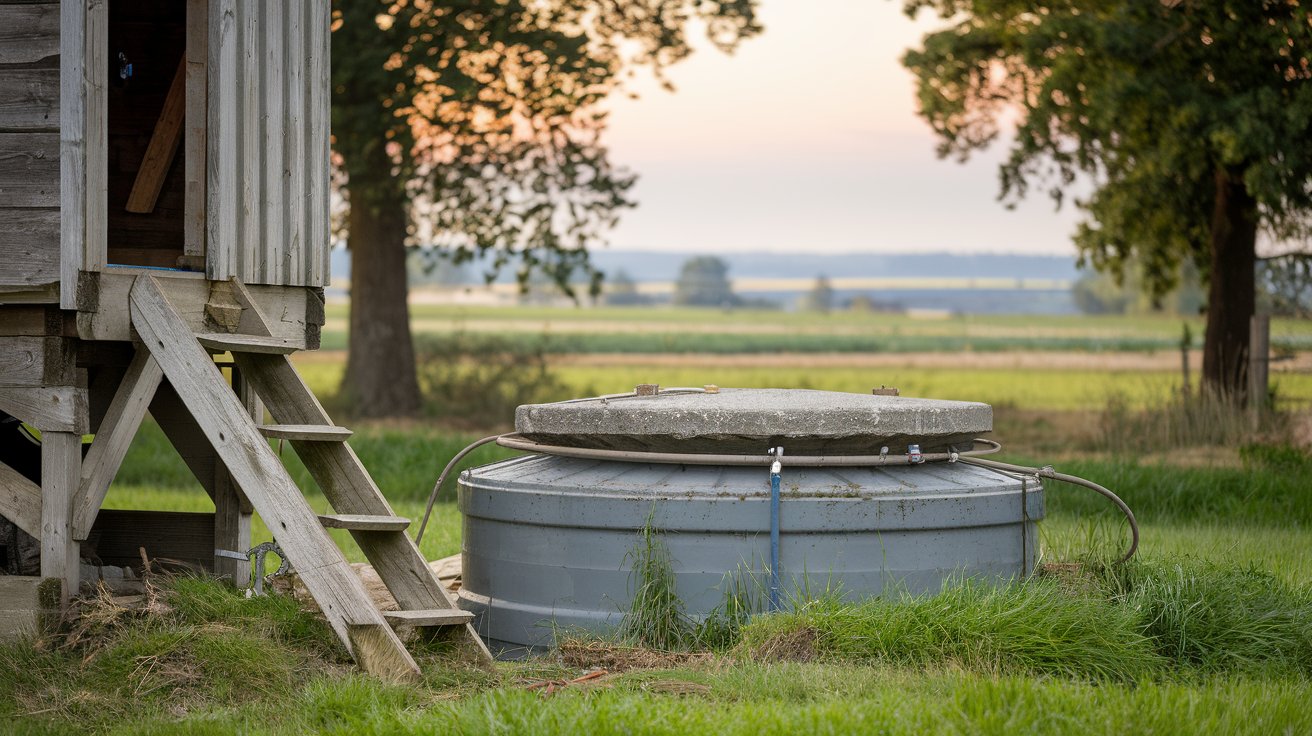Is your septic system giving you trouble? Septic systems play a crucial role in managing household wastewater, but they aren’t immune to wear and tear. Identifying the signs of a failing septic system early can save you thousands in repairs and prevent environmental hazards. In this article, we’ll walk you through the most common symptoms, what they mean, and how to address them to keep your system functioning efficiently.
Table of Content
- What Is a Septic System and How Does It Work?
- Why Early Detection of a Failing Septic System Matters
- Preventive Measures to Avoid a Failing Septic System
- FAQs
- Septifix
- Septic Permit Links by State
What Is a Septic System and How Does It Work?
A septic system is an underground wastewater treatment setup commonly used in homes without access to municipal sewer systems. It consists of a septic tank and a drain field (or leach field).
- Septic Tank: Stores and separates waste, allowing solids to settle at the bottom while liquids flow into the drain field.
- Drain Field: Filters the wastewater into the surrounding soil.
When this system is working well, it treats and disposes of wastewater safely. But over time, wear, poor maintenance, or environmental factors can cause it to fail.
Why Early Detection of a Failing Septic System Matters
A failing septic system is not just a plumbing issue—it can contaminate groundwater, damage your property, and create serious health risks. Catching the symptoms early helps:
- Minimize repair costs
- Avoid health hazards
- Extend your system’s lifespan
Let’s dive into the most common symptoms of septic system failure.
1. Slow Draining Fixtures
Slow-draining sinks, tubs, or toilets are often the first sign of trouble. This issue arises when the septic tank becomes overloaded or when clogs block the system’s pipes.
- Primary Causes: Excessive water usage, grease buildup, or foreign objects flushed down drains.
- Solutions: Reduce water usage, avoid flushing non-biodegradable items, and consider professional cleaning to remove clogs.
If the problem persists despite these efforts, it may signal a more significant issue like a failing drain field.
2. Gurgling Sounds in the Plumbing
Hearing strange gurgling noises from your pipes? This symptom often indicates trapped air or blockages in your plumbing system.
- What It Means: Wastewater isn’t flowing freely to the septic tank, often due to blockages or tank overflow.
- Steps to Take: Check for clogs in your pipes or call a professional to inspect your tank and system.
Ignoring these sounds can lead to backups, which pose a greater challenge to resolve.
3. Foul Odors Indoors or Outdoors
One of the most unpleasant signs of a failing septic system is the smell of sewage.
- Indoors: Odors from sinks or drains may suggest that sewage is backing up into your home.
- Outdoors: A rotten egg smell near your drain field usually points to untreated wastewater surfacing.
- How to Address It:
- Check vents for blockages.
- Have your septic tank pumped if it hasn’t been maintained regularly.
- Ensure the drain field isn’t saturated or blocked.
4. Pooling Water in the Yard
Water pooling near the drain field or septic tank is another major red flag.
- Causes: This occurs when the drain field cannot absorb wastewater due to oversaturation, clogs, or system failure.
- Associated Risks: Pooling water can contaminate nearby soil and pose a health risk to humans and pets.
Professional intervention is often required to repair or replace parts of the drain field or septic tank.
5. Sewage Backups in Drains
Sewage backups are among the most severe and alarming signs of septic failure.
- Where It Happens: Backups may occur in toilets, sinks, or tubs.
- Why It Happens: A full tank, pipe blockages, or drain field failure can prevent wastewater from leaving the system.
This situation requires immediate attention to avoid significant damage to your property and prevent exposure to harmful bacteria.
6. Lush Green Grass Over the Drain Field
While a green lawn is often a homeowner’s pride, excessively lush grass over the drain field can be a warning sign.
- What It Indicates: A leaking or failing septic system may be overfertilizing the soil with untreated wastewater.
- Potential Consequences: Untreated waste can seep into nearby water sources, causing pollution.
Inspect your system to confirm whether it’s operating correctly or if repairs are necessary.
7. High Nitrate Levels in Nearby Wells
For those with private wells, a failing septic system can lead to increased nitrate levels in the water supply.
- Health Concerns: Elevated nitrates can harm infants and pose risks to pregnant women.
- Testing Water Quality: Regular testing can help detect contamination early, especially if septic issues are suspected.
If tests reveal high nitrate levels, consult a professional immediately to inspect your system.
8. Unusual Vegetation Growth Around the Septic Tank
Vegetation such as weeds or shrubs growing unusually well near your septic system could signal a leak.
- Cause: Nutrient-rich wastewater escaping the tank or pipes promotes rapid plant growth.
- What to Do:
- Clear excess vegetation.
- Inspect for cracks or leaks in the tank.
- Schedule repairs as needed.
9. Frequent Need for Pumping
Septic tanks usually need to be pumped every 3–5 years, depending on the household size and water usage. If you find yourself needing frequent pumping, it could indicate underlying problems.
- Possible Issues: A damaged drain field, tank leaks, or improper usage patterns.
- Next Steps:
- Consult a septic professional.
- Assess the tank size and usage demands.
10. Spongy Soil Around the Drain Field
Feeling spongy or marshy soil underfoot in your drain field is another key sign of trouble.
- Reason: The drain field is oversaturated and cannot process wastewater effectively.
- Risk: This could escalate into a complete system failure if not addressed promptly.
Schedule an inspection to diagnose the extent of the damage and determine repair options.
Preventive Measures to Avoid a Failing Septic System
Prevention is better than cure when it comes to septic system care. Here are some tips to keep your system in top shape:
- Regular Pumping: Stick to a maintenance schedule to prevent overflow.
- Proper Usage: Avoid flushing grease, wipes, or other non-biodegradable materials.
- Water Conservation: Excessive water usage strains your system. Install low-flow fixtures if necessary.
- Routine Inspections: Regular check-ups can catch small issues before they escalate.
Recognizing the symptoms of a failing septic system early is essential to protecting your property and health. Whether it’s foul odors, slow drains, or water pooling in your yard, addressing these signs promptly can prevent costly repairs and environmental hazards.
Need expert help with septic system maintenance or repairs? Don’t wait—reach out to a professional today to keep your system running smoothly.
FAQs
How often should I pump my septic tank?
Most tanks need pumping every 3–5 years, but the frequency depends on household size and usage.
Can heavy rainfall affect my septic system?
Yes, excessive rain can saturate the drain field, making it less effective at processing wastewater.
Are septic system failures covered by homeowners’ insurance?
Policies vary. Check with your provider to determine if septic repairs or replacements are included.
What should I do if I smell sewage near my home?
First, inspect for clogs or backups. If the issue persists, call a septic professional immediately.
How can I prevent septic system failures?
Regular maintenance, water conservation, and avoiding non-biodegradable waste are key preventive measures.
Costs of Septic System Upgrades: Essential Improvements and Expenses
Vermont Septic System Regulations: What Homeowners Need to Know
Drain Field vs. Leach Field: What’s the Difference?
Outdoor Septic Odors: What to Do
Directory | New York Septic Service Providers : Part 2
Directory | New York Septic Service Providers : Part 1
Wisconsin Septic System Rules for Property Owners
Septifix: A Septic-Safe Treatment Solution
Septifix










